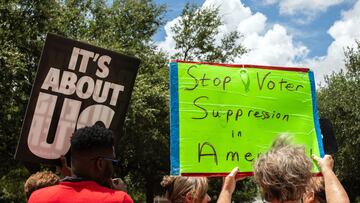What is critical race theory? What topics were cut under Texas’ new anti-CRT education bill?
A controversial education bill targeting critical race theory in public schools has passed the Texas Senate. Our team took a look at what it includes.


On the heels of passing one of the most restrictive voting laws in the country, the Texas state Senate has made headlines again. This time with a bill targeting critical race theory in public schools.
What is critical race theory?
Critical race theory (CRT), a niche part of academic work, has become a central point of contention in the national discussion over racial and civic education in the United States.
In 2006, a professor at UC Riverside described how those studying CRT “shifts the research lens away from a deficit view of Communities of Color as places full of cultural poverty disadvantages.” Rather those who wish to apply this ‘lens’ focus and learn "from the array of cultural knowledge, skills, abilities, and contacts possessed by socially marginalized groups that often go unrecognized and unacknowledged.”
However, this definition differs from that of many Republican leaders who have bashed CRT and called for it to be banned from the educational curriculum. Several prominent outlets have reported that rather than taking the time to understand the roots and literature of CRT, Republicans have "repurposed" it to create "a catchall term for discussions of race.”
Critical race theory has been called "anti-white" and "not American."
— AJ+ (@ajplus) July 22, 2021
Let's debunk some myths: pic.twitter.com/BORtNumtVU
Many public school educators will acknowledge that much of what they are required to teach would not fall under anti-racism education. In the wake of events, like the killing of George Floyd, some teachers are pushing for anti-racist themes to be included in state educational standards, and are met with backlash.
In June during an interview with NBC Dr. Jonathan Chism, a history progressor at the University of Houston–Downtown argued that “Any anti-racist effort is being labeled as critical race theory.”He continued saying that these new laws popping up are based on an ignorant understanding of the material saying “Many that are condemning critical race theory haven’t read it or studied it intensely. This is largely predicated on fear: the fear of losing power and influence and privilege,” he said. For Dr. Chism, “The larger issue that this is all stemming from is a desire to deny the truth about America, about racism.”
What have Texas Republicans proposed?
In Texas, Senate Bill 3 has gained national attention for its changes to the education code that would “unduly would restrict important, but challenging, conversations that otherwise should occur in classrooms," according to State Senator Zaffirini.
SB 3 amends Chapter 28 of the Texas Educational Code, which focuses on “essential knowledge” and “curriculum.”Chapter 28 does not currently require any specific topics or events to be taught by social studies teachers.
The bill would direct the State Board of Education to “adopt essential knowledge and skills that develop each student’s civic knowledge” for children grades kindergarten through grade 12. Since the initial proposal was released, Republicans eliminated topics seen as important by educators to ensure students have a solid understanding of history and civic life in the United States.
What topics were left out of the bill?
Various topics proposed by Democrats in the Senate were left out of the final bill, including the history of Native Americans and the writings of the founding mothers and other founding persons.
As for basic freedoms endowed to US citizens by the constitution, the bill includes language to ensure students have an appreciation of “a commitment to free speech and civil discourse.” However, the writings and work of Frederick Douglas and laws such as the Indian Removal Act, which led to the Trail of Tears, and the Fugitive Slave Act were taken out; as were the teaching of material related to the “civic accomplishments of marginalized people,” including Martin Luther King Junior, Cesar Chavez, and Delores Huerta.
Language encouraging teachers to educate their students on the history of social movements, including the Civil Rights Movement, the Chicano Movement, and the fight for women's suffrage, were also scrapped.
The law also bans teachers from teaching that "the advent of slavery in the territory that is now the United States constituted the true founding" of the country. This may seem unimportant, but it is an effort to whitewash the dehumanizing and racist views of the founding fathers. Slavery was a major point of controversy during the founding of the United States, and while it is a stain on the nation's history, the support it had among the founders should not be erased.
Most shocking to many activists and educators was the elimination of the section on “the history of white supremacy, including but not only limited to the institution of slavery, the eugenics movement, and the Ku Klux Klan.”
Concerns that were brushed off by Fox News, who called reports on the bill “misleading,” while acknowledging that the “revised Senate bill removed this provision from the legislation.”
Are these topics included in the Texas Educational Standards?
To better understand how SB 3 would impact state educational standards, the Texas Tribune reached out to Keven Ellis, the chair of the State Board of Education. In an e-mail, Ellis stated that many of the topics that the law targets are “are already included in the state education standards, which are referred to as Texas Essential Knowledge and Skills.”
The Texas Senate advanced bills censoring how teachers can discuss race in their classrooms and banning medicated abortions before most people know they're pregnant.
— ACLU of Texas (@ACLUTx) July 19, 2021
But without a quorum in the House, neither can become law. #TXlege https://t.co/iMEq7dF2dr
In Texas, study US and state history in fourth, fifth, seventh, eighth, eleventh, and twelfth grades. With some glaring omissions, many of the bill's topics appear in the standards.
For example, students are expected to learn about the accomplishments of major figures in American history such as “Susan B. Anthony, Martin Luther King Jr., Rosa Parks, [and] Cesar Chavez,” which had been taken out of SB 3.
In fifth grade, teachers are expected to “explain the central role of the expansion of slavery in causing sectionalism, disagreement over states' rights, and the Civil War,” but that is as far as the standards go on the topic of slavery.
Related stories
At the high school level, ethnic studies courses studying the history of African and Mexican Americans have been approved in recent years. In the course focused on the history and experience of Black people in the United States, teachers are required to teach topics including ”contributions of African history that are foundational to humanity and predate American slavery.” However, the connections between white supremacy and slavery and the KKK are not required within the state standards.
Will the bill become law?
Currently, many believe SB 3 does not have the votes needed in the Texas House to become law. Additionally, many Democrats members have fled the state to avoid the passage of a restrictive voting law.

